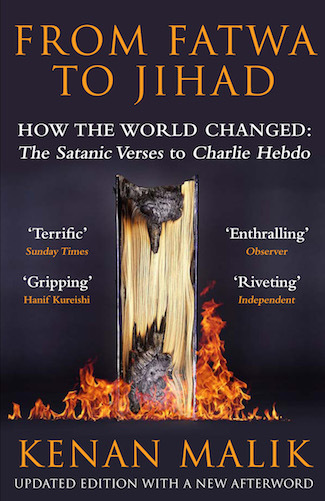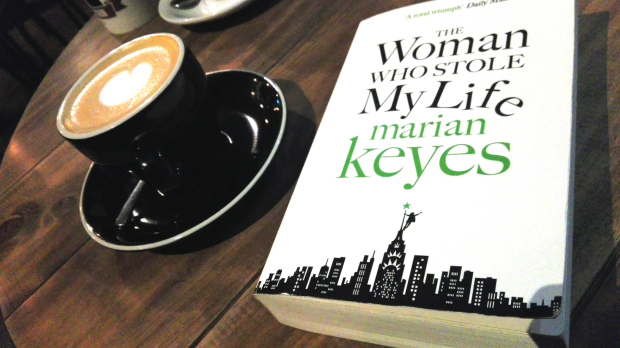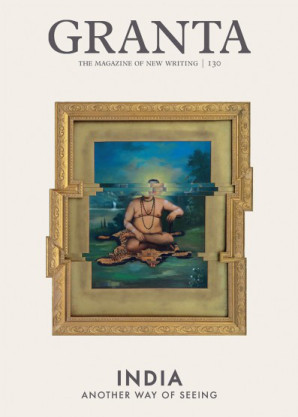

There is a long and thoughtful essay by James Ley in the Sydney Review of Books entitled ‘The Pleasure of Hating’ that reviews my From Fatwa to Jihad in parallel with Pankaj Mishra’s The Age of Anger. Here is an extract; the whole essay is well worth reading.
. Extract from ‘The Pleasure of Hating’ by James LeySydney Review of Books, 24 October 2017
There is ultimately something a little lopsided about Mishra’s despairing argument in Age of Anger, which arises from its psychological emphasis. Strictly speaking, the totalising phrase ‘global civil war’ is contradictory. The spectre it summons of a reversion to a Hobbesian state of nature, with its war of all against all, makes a point about the apparent hegemony of the globalised neoliberal order, the way in which it disempowers nation states and forces people into competition with each other. As Margaret Thatcher made clear, neoliberalism refuses on an ideological level even to recognise the existence of such a thing as ‘society’. (This founding principle is succinctly expressed in the rousing cry of the Underground Man: ‘I say let the world go to hell, but I should always have my tea.’ If the drones at the Institute of Public Affairs had a modicum of wit, they might adopt it as their motto.) But the rise of this narrow, doctrinaire and morally stunted worldview is a relatively recent phenomenon, and its intellectual hegemony is not comprehensive. Nor is it, as Mishra sometimes seem to imply, coterminous with modernity itself, or an inevitable outcome of its internal logic.
Given that the modern world is driven by ideas, we would seem to have little choice but to recognise that the current system is merely one possibility among many, to believe that some kind of incremental moral progress is achievable, and try and change things for the better, however insurmountable contemporary problems might seem. Mishra does not indicate how we should interpret the history of genuine progress that falls outside the purview of Age of Anger but nevetheless runs parallel to its account of rage and violence – that Whiggish history of activism and social reform, which has opposed inequality and discrimination, and which has resulted in numerous tangible achievements, imperfectly realised though these may be. The tenor of his argument suggests that such modest gains are overshadowed by the destruction and chaos of the past few centuries, and that social advances can always be thrown into reverse. But the unhappy implication of his argument is also that the metaphysics of modernity have fused the conditions of progress to violent reaction, such that the former will inevitably beget the latter. As such, his argument slides into a gloomy fatalism. ‘Political and economic life,’ he laments near the end of Age of Anger, ‘seems to have no remedy for the emotional and psychological disorders it has unleashed.’
This is, I think, the most significant difference between Kenan Malik and Mishra. From Fatwa to Jihad – an updated and expanded version of a book Malik first published in 2009 – maintains a clear focus on the specific issues at stake in the conflicts it examines. He agrees with Mishra that contemporary manifestations of discontent need to be understood as symptoms of social conditions, arguing that radical Islam is ‘very much a child of modern plural societies’ and that the ‘new political fault line is not between left and right, between social democracy and conservatism, but between those who feel at home in – or at least are willing to accommodate themselves to – the new globalized, technocratic world, and those who feel left out and disempowered’. But he also positions himself as an old-school humanist, a partisan of secular universalism. The important point for Malik is not simply that the world we now inhabit has been decisively shaped by the Enlightenment’s intellectual revolution and the dialectic of progress and reaction it set in motion; it is that the emancipatory project of the Enlightenment remains unfinished.
Malik takes the Rushdie affair as his starting point, proposing that this pivotal event ‘gave notice not just of a new Islam but also of a new left’. One of the central contentions of From Fatwa to Jihad is that in the decades since Ayatollah Khomeini sentenced Salman Rushdie to death for writing The Satanic Verses (1988), urging the faithful to murder not only the author but anyone involved with the novel’s publication, Western liberals have ‘effectively internalised the fatwa’. Those who denounced Rushdie, writes Malik, ‘lost the battle in the sense that they never managed to stop publication of The Satanic Verses. But they won the war by pounding into the liberal consciousness the belief that to give offence was a morally despicable act’.
In taking the Rushdie affair as his starting point, Malik treats the rise of the identity politics of the new left as a post-Cold War phenomenon, but its origins can be traced back a little further to the social revolution of the 1960s. The slogan ‘the personal is political’ was first used as the title of an essay published in 1969 by a feminist collective called Redstockings. As Andrew Hartman points out in A War for the Soul of America: A History of the Culture Wars (2015) – a book that is, among other things, an excellent guide to the way in which the cultural controversies of recent decades have reshaped political discourse – the line was not so much a statement of principle as the encapsulation of a tactic. The second-wave feminists of that era sought to use personal testimonies to instantiate their arguments, encourage a sense of solidarity, and expose the way in which the patriarchal culture belittled or excluded their experiences and concerns. The strategy was common among other liberation movements. The rationale for this personalisation of politics was that it highlighted the reality of discrimination. Its justification was its appeal to the fundamental principle of equality (my life is every bit as important and deserving of respect as yours); its rhetorical effectiveness was that such personal testimonies cannot be gainsaid (my experience is my experience).
What this exposes, however, is the inherent tension within the notion of equality between universality and particularity. Malik is interested in the way in which the left’s commitment to the former seems to have been almost entirely displaced by an attitude of deference toward the latter, and there is a somewhat ironic appropriateness in the fact that he has a personal reason for this preoccupation. As he explains near the beginning of From Fatwa to Jihad, the constant racism he experienced growing up in England had the effect of driving him toward left-wing activism and an embrace of the principles of common humanity and universal rights; the puzzle he confronts is why so many young men of similar backgrounds and experiences are today more likely to embrace an assertive ethnic or religious identity.
Read the full review essay in the Sydney Review of Books.
. Buy the book!
(Click on the cover)
Share this:- More





